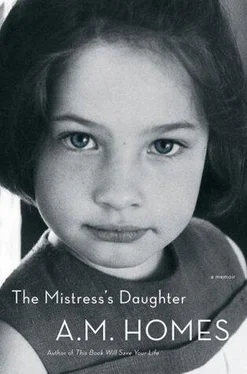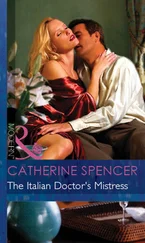“What do you mean, strange?” I ask.
She tells me about her mother dying of a stroke a couple of years earlier. She tells me about her own life falling apart, how she moved from Washington to Atlantic City. She tells me that after she gave birth to me her mother wouldn’t come to the hospital to pick her up. She had to take the bus home. She tells me that it took all her strength and courage to come looking for me.
And then she says, “Have you heard from your father? It would be nice if the three of us could get together,” she says. “We could all come to New York and have dinner.”
She wants everything all at once and it is too much for me. I am talking to the woman who has loomed in my mind, larger than life, for the entirety of my life, and I am terrified. There is a deep fracture in my thoughts, a refrain constantly echoing: I am not who I thought I was, and I have no idea who I am.
I am not who I thought I was, and neither is she the queen of queens that I imagined.
“I can’t see you yet.”
“Why can’t I see you?”
I am tempted to tell her, You can’t see me right now, because right now I am not visible to anyone, even myself. I have evaporated.
“When can we talk again?” she asks as we are hanging up. “When? I hope you will forgive me for what I did thirty-one years ago. When can I see you? If you said yes, I would come there right now. I would be at your door. Will you call again soon? I love you. I love you so much.”
My parents return from dinner. I am looking at a picture of her, a Xerox of her driver’s license that the lawyer forwarded to me. Ellen Ballman, strong, thick, fierce, like a prison matron. There is another photo in the envelope — Ellen with a niece and nephew, with stuffed animals in the background. There is something about the way feeling moves across the face — something vaguely familiar. In the cheeks, the eyes, eyebrows, forehead I see traces of myself.
“How did she have Frosh’s name?” my mother wants to know.
“She said she’d heard it once and never forgot.”
“Interesting,” my mother says, “because Frosh wasn’t the first lawyer; the first lawyer died and we got Frosh after you were born, when we were having some problems.”
“What kind of problems?”
“She never signed the papers. She was supposed to sign them before she left the hospital and she didn’t. And then we arranged for her to go into a bank to sign them, and she never showed up. She never signed anything and when we first went to court the judge wouldn’t let us adopt you because the papers weren’t signed. It took more than a year after that and then finally a second judge allowed us to adopt without a signature. For an entire year, I lived in fear. I was afraid to leave you alone with anyone except dad and Grumama, afraid if I turned around she’d come back and you’d be gone.”
I think of my mother having lost a child six months before I was born, having ushered him into and out of the world. I think of her having received me as a kind of get-well gift and then worrying that at any moment I too would be gone. I don’t tell my mother one of the first things Ellen Ballman said to me: “If I’d known where you were I would have come and gotten you.” I don’t tell my mother that it turned out that all along Ellen Ballman wasn’t far away — a couple of miles. “I used to look at children,” Ellen told me. “And sometimes I followed them, wondering if they were you.”
Our conversations are frequent — I call her a couple of times a week but I don’t give her my phone number. They are seductive, addictive, punishing. Each one shakes me; each requires a period of recovery. Each time I tell her something, she takes the information and holds it too close, reinventing it and delivering it back to me in a manner that leaves me wanting to tell her less, wanting her to know nothing.
She tells me that she never got along well with her stepfather and that her mother was cold and cruel. I feel that there’s more to the story than she’s telling me. I get the sense that something was happening at home involving the stepfather, and that the mother knew and blamed her for it — which would also explain the animosity between them and why Ellen, as a teen, was propelled into the arms of a much older, married man. I never ask her the question directly. It seems intrusive; her need to protect herself is stronger than my need to know. There is an odd and anxious unknowing to much of what she says that makes it difficult to get the story straight. She reminds me of Tennessee Williams’s Blanche DuBois, moving from person to person, desperate to get something, to find relief from unrelievable pain. Her lack of sophistication leaves me unsure whether she’s of limited intelligence or simply shockingly naive.
“Did you think of having an abortion?”
“The thought never occurred to me. I couldn’t have.”
Pregnancy, I gather, was the perfect way out of her mother’s house and into my father’s life. It must have seemed like a good idea, until my father refused to leave his wife. He tried. He sent Ellen to Florida saying he’d join her there — and never showed up. Three months later, homesick, she returned to Washington. They got an apartment together; for four days, he lived with Ellen. Then he went back, claiming that “his children missed him.” Ellen had him arrested under an old Maryland ordinance for desertion. At the time his wife was also pregnant, with a boy who was born three months before I was.
“At one point he told me to meet him at his lawyer’s office,” she says, “so we could figure out a way to ‘take care of everything.’ I sat down with him and his lawyer and the lawyer drew a diagram and said, ‘There’s a pie and there are only so many slices of the pie and that’s all there is and it’s got to go around.’ ‘I am not a slice of pie,’ I said, and walked out. I have never been so angry in my life. Slices of pie. I told my friend Esther I was expecting a baby and didn’t know what to do. She told me she knew someone who wanted to adopt a baby. I told her the baby must go to a Jewish family who would treat her well. I referred to you as ‘the baby.’ I didn’t know if you were a boy or a girl. I couldn’t take care of you myself — young ladies didn’t have babies on their own.”
She interrupts herself. “Do you think, one day, we might have a portrait painted of the two of us?” Her request seems to come from another world, another life. What would she do with a portrait? Hang it over her fireplace in Atlantic City? Send it to my father for Christmas? She is in stopped time, filled with fantasies of what might have been. After thirty-one years, she has returned to reclaim the life she never had.
“I have to go, I’m late for dinner,” I say.
“Okay,” she says. “but before you go out, put on your cashmere sweater so you don’t get chilly.”
I don’t have a cashmere sweater.
“When can I see you?” she starts again.
“Ellen, this is all new for me. You might have thought about it for a long time before you contacted me, but for me it’s only a couple of weeks. I need to take things slowly. We’ll talk again soon.” I hang up. The sweater is Ellen’s fantasy, an image of an experience that is not my own, but one that has meaning, import elsewhere — in her past.
I am losing myself. On the street I see people who look alike — families where each face is a nuanced version of the other. I watch how they stand, how they walk and talk, variations on a theme.
A few days later, I try Ellen again.
“Ruggles slept in the hall,” she says. Ruggles is the stuffed animal I sent her, in a gesture of kindness. Tonight Ruggles is me.
There is the flick of a lighter, the suck of a cigarette.
Читать дальше












